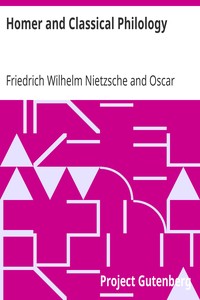Homer and Classical Philology
Author: Friedrich Wilhelm Nietzsche
Bookshelves: Culture/Civilization/Society, Literature, Philosophy & Ethics, Category: Essays, Letters & Speeches, Category: Philosophy & Ethics, Philosophy

Summary
"Homer and Classical Philology" by Friedrich Wilhelm Nietzsche is an academic lecture delivered as an inaugural address at Bâle University in the late 19th century. This work discusses the intricacies and challenges associated with classical philology, particularly focused on the figure of Homer and the nature of his contributions to literature. Nietzsche reflects on the various perspectives and debates surrounding Homeric studies, positioning the complexity of philology against its many opponents. In this lecture, Nietzsche explores the "Homeric question," primarily regarding the personality and historical context of Homer. He examines how different interpretations of Homer have evolved, reflecting broader cultural shifts in understanding poetry. Through a critique of both traditional beliefs and contemporary methodologies in literary studies, Nietzsche argues for the necessity of recognizing the amalgam of artistic and historical influences shaping the works attributed to Homer. He emphasizes that the greatness of the Homeric epics lies not solely in the genius of a singular poet, but also in the collective contributions of a culture that produced these enduring narratives. (This is an automatically generated summary.)
 LibraryManager
LibraryManager